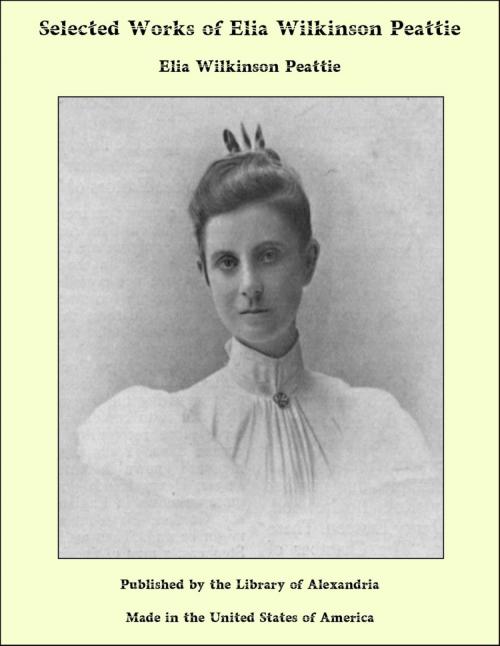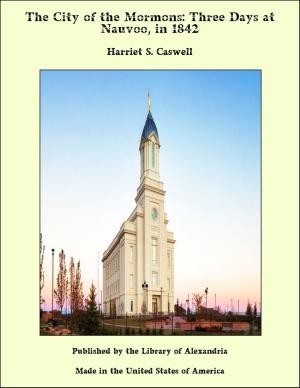Selected Works of Elia Wilkinson Peattie
Nonfiction, Religion & Spirituality, New Age, History, Fiction & Literature| Author: | Elia Wilkinson Peattie | ISBN: | 9781465612694 |
| Publisher: | Library of Alexandria | Publication: | March 8, 2015 |
| Imprint: | Language: | English |
| Author: | Elia Wilkinson Peattie |
| ISBN: | 9781465612694 |
| Publisher: | Library of Alexandria |
| Publication: | March 8, 2015 |
| Imprint: | |
| Language: | English |
ONE who enters Chicago unacquainted with it, having no open sesame to its hospitable doors, knowing the city only by its streets, its hotels, and its theatres, is disturbed by an unpleasant emotion. If he comes from some well-regulated, cultivated, and placid town of the eastern part of this country, or from England or Germany, he feels shaken out of poise and peace by a tremendous discord. He sees a city ankle-deep in dirt, swathed in smoke, wild with noise, and frantic with the stress of life. He sees confusion rampant, and the fret and fume of the town rise and brood above it like hideous Afrits. But as time goes on — and even supposing the man continues to remain a stranger among the two millions of his fellow men who make up the city — he experiences a change of sentiment. He ceases to be shocked, and becomes interested. It occurs to him that if commerce is ever epic, it is so here. He feels the beat of the city like the vibration of mighty drums, and the thing he thought a discord he discovers to be the rhythm of great movements. The drab sky, the dirty streets, the dusky air, the dark-clothed figures of the people, are all in harmony, and it seems dramatically fitting that a city in the throes of its toil should wear its working clothes. It is grimy with its labor, and breathless and noisy forging its Balmung with mighty shouts. He who comes to Chicago to seek his fortune, possessing delicate traditions, having been brought up among persons of similar traditions, is confused and angered by the treatment he receives. He discovers that he must be successful if he would be noticed; that he must be in need if he would be helped. But if he makes his way in law-abiding, frugal, and lonely fashion, he will attract no attention. And first and last, in poverty and in riches, in sickness and in health, the town will roar at him; if he is afraid, it will roar twice as loud as it did before. Its furnaces and forges, its cable systems and syndicates, its slaughterhouses and wheatpits, its railroads and elevators, its greedy breadwinners and greedy millionaires, and the boats upon its filthy river will all roar. So, inevitably, at last, in a puny way, he will roar back. He will say Chicago has no peace, no leisure, no aspirations save those of a materialistic sort, no religion, no refinement. Sometimes, even after he has found he is mistaken in saying these things, he will go on saying them, because he cannot forgive Chicago for enticing him, with her commercial allurements, away from the home of his youth and the things to which he was born. He lays to her account all the pangs of homesickness which he suffers, and he misrepresents her, as it is the fate of new cities to be misrepresented.
ONE who enters Chicago unacquainted with it, having no open sesame to its hospitable doors, knowing the city only by its streets, its hotels, and its theatres, is disturbed by an unpleasant emotion. If he comes from some well-regulated, cultivated, and placid town of the eastern part of this country, or from England or Germany, he feels shaken out of poise and peace by a tremendous discord. He sees a city ankle-deep in dirt, swathed in smoke, wild with noise, and frantic with the stress of life. He sees confusion rampant, and the fret and fume of the town rise and brood above it like hideous Afrits. But as time goes on — and even supposing the man continues to remain a stranger among the two millions of his fellow men who make up the city — he experiences a change of sentiment. He ceases to be shocked, and becomes interested. It occurs to him that if commerce is ever epic, it is so here. He feels the beat of the city like the vibration of mighty drums, and the thing he thought a discord he discovers to be the rhythm of great movements. The drab sky, the dirty streets, the dusky air, the dark-clothed figures of the people, are all in harmony, and it seems dramatically fitting that a city in the throes of its toil should wear its working clothes. It is grimy with its labor, and breathless and noisy forging its Balmung with mighty shouts. He who comes to Chicago to seek his fortune, possessing delicate traditions, having been brought up among persons of similar traditions, is confused and angered by the treatment he receives. He discovers that he must be successful if he would be noticed; that he must be in need if he would be helped. But if he makes his way in law-abiding, frugal, and lonely fashion, he will attract no attention. And first and last, in poverty and in riches, in sickness and in health, the town will roar at him; if he is afraid, it will roar twice as loud as it did before. Its furnaces and forges, its cable systems and syndicates, its slaughterhouses and wheatpits, its railroads and elevators, its greedy breadwinners and greedy millionaires, and the boats upon its filthy river will all roar. So, inevitably, at last, in a puny way, he will roar back. He will say Chicago has no peace, no leisure, no aspirations save those of a materialistic sort, no religion, no refinement. Sometimes, even after he has found he is mistaken in saying these things, he will go on saying them, because he cannot forgive Chicago for enticing him, with her commercial allurements, away from the home of his youth and the things to which he was born. He lays to her account all the pangs of homesickness which he suffers, and he misrepresents her, as it is the fate of new cities to be misrepresented.















